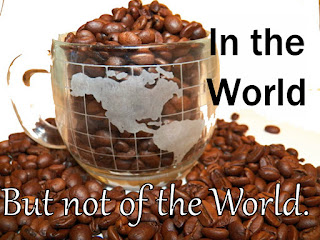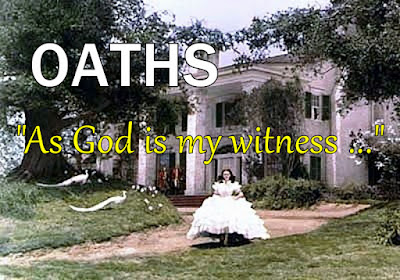RULES OF ENGAGEMENT
PART II OF "IT'S A BIG BAD WORLD"
Matthew 5:38-48
Romans 12:9-21
Evil. Such a little word -- but such a complex concept and problem in the world. There's the personification of evil, the devil. There are evil conditions that exist that run counter to God's intent for human beings and creation, like war, injustice, oppression, exploitation, hunger, pollution, abuse in all its manifestations, and on and on. There's also the ordinary acts of evil that when we decide to willfully go against God's law of love. So, if we are to overcome evil (Romans 12:21), where do we begin?
Enter the Wood Cutter.
Like some of us, I grew up reading fairy tales or watching the Disney version of them. Little Red Riding Hood is a classic story of the triumph of good over evil. The wood cutter, the hero, rescues the Little Red Riding Hood and her grandmother from the the clutches of the fanged and furry villain (our representative of evil). With a blow of his axe, he kills the wolf, and they all live happily ever after.
If life is full of troubles and pain that are beyond our control, it can be a comforting story. It assures us that everything will work out in the end and good will win the day. But what if ... we're the wood cutter in the story of our life? What if Jesus is calling us, nay, commanding us to be a wood cutter in God's plan of salvation and redemption?!?
The complexity of evil and sin appears to us like a skein of yarn attacked by a hyper-active kitten or an extra long extension cord or a garden hose that wasn't put away properly. It's a tangled, knotted mess. If we start pulling willy-nilly, the knots only tighten, and it becomes harder to untangle. No, the best way is to find a loose end and work from there. Start with the end you can find.
The complexity of evil and sin appears to us like a skein of yarn attacked by a hyper-active kitten or an extra long extension cord or a garden hose that wasn't put away properly. It's a tangled, knotted mess. If we start pulling willy-nilly, the knots only tighten, and it becomes harder to untangle. No, the best way is to find a loose end and work from there. Start with the end you can find.
And so, as Christ's woodcutters, we don't blindly attack the whole of evil in our world. We engage with our end of things, that bit of the world that we're part of. We begin with our ordinary, every day lives, seeking to do good in our relationships with others and in the conditions we find in our own community.
John Wesley, the founder of Methodism, gave us three general rules of engagement to help us in our struggle against evil:
Rule #1: Do no harm. Looking at Matthew 5:38-48 and Romans 12:9-21, following the first rule means:
- Don't seek revenge.
- Don't hate anyone, no matter who or what they are.
- Don't love only those who will benefit us in some way.
- Don't pretend to love people and then malign them or gossip about them behind their backs.
- Don't be stingy with our lives, our time and with our resources.
- Don't ignore what's going on in the lives of people around us.
- Don't pay back evil with more evil; don't hold grudges.
- Don't be contentious, stirring up trouble between ourselves and others.
- Don't look down on other people and disrespect them.
Rule #2: Do good. Our scripture passages advise us to:
- Forgive.
- Do more than just what is expected of us.
- Pray for God's goodness and love for those who have hurt us or have bullied us.
- Love everyone genuinely, sincerely, and unconditionally, as Christ has loved us.
- Be generous with our time and resources with others.
- Love people like they're part of our own family.
- Be humble and show honor and respect to all people, no matter who they are and what their circumstances are.
- Be involved with people, sharing their joys and supporting them in times of sorrow.
- Whenever we can, be peace makers.
- Be kind and compassionate towards those who don't like you.
- When we see wrong happening, be part of the solution rather than the problem.
Rule #3: Stay connected with God through Christ by the spiritual practices of worship, prayer and bible study (both personal and in small groups) and experience the presence of Christ through the sacraments of Holy Communion and baptism.
While all three rules are equally important, following the third rule is what empowers us to stand against the brokenness and sin of the world and to live lives that counter the affect of evil in our life and in our world. It is during these points of contact with God's grace, that the Holy Spirit cultivates characteristics and behaviors necessary for being Christ's wood cutters: love, joy, peace, patience, kindness, goodness, faithfulness, gentleness and self-control (Galatians 5:22-23).
In the story of Little Red Riding Hood, the wood cutter is the hero. He doesn't have magical powers or superhuman strength. He's just ordinary folk, like you and me. He works hard for a living, supporting his family and providing a needed service for his neighbors. What makes him a hero, is that, when he encounters evil, he does what he knows is right and good. He saves the day, he makes a difference in the lives of those he encountered that day in the forest.
Those are the kinds of heroes God invites to join God in the battle against evil. We don't need magical powers and super human strength, or even fancy costumes. We just need to be willing and intentional about living as the people Christ has called us to be, avoiding doing harm, enthusiastic about doing good, and being faithful in our relationship with God.
How will we live out the rules of engagement in our lives?



Comments
Post a Comment